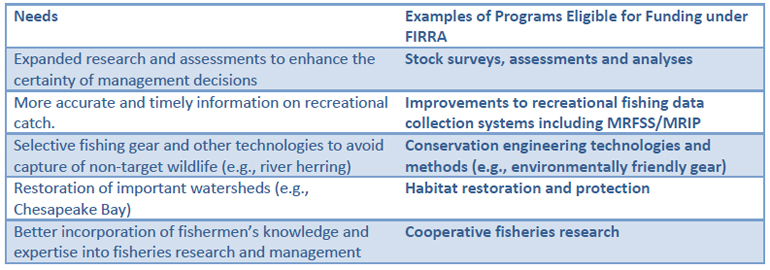The Fisheries Investment Act: Strengthening the Mid-Atlantic's Fisheries and Fishing Communities
The Fisheries Investment Act (FIA) is new legislation that would re-direct existing revenues from duties on imported fish products (estimated at $124 million for FY 2013) to support critical research, monitoring, and management programs, as well as provide assistance to fishermen and fishing communities.
From striped bass and bluefish to summer flounder, here in the Mid-Atlantic we're enjoying the benefits of improved management of our fisheries resources. Stronger, healthier fish stocks mean tighter lines, happier clients, and more great seafood delivering billions of dollars up and down the coast. The FIA will help build on our success, and ensure good fishing for generations.Steve Bechard, Owner/President of Rise Fishing Co.
This bill would create a regionally-based grant program that would direct 70 percent of the money (approximately $85 million in FY 2013) per year to fund fisheries research and management programs. The councils would establish investment committees responsible for identifying funding priorities and making recommendations on which specific projects should be supported in each region.
Stronger Mid-Atlantic fisheries and fishing communities
With most of the region's federally-managed fish stocks at healthy levels, the Mid-Atlantic is now enjoying the benefits of improved management of its commercial and recreational fisheries, including steadily increasing fishing opportunities for important species such as summer flounder. Funding through FIA could help the Mid Atlantic build upon its management successes and address needs going forward, including:

In addition to the regional grant program, the secretary of commerce (who oversees NOAA) may use the remainder of the funds for special fisheries needs and problems, including management of highly migratory species, seafood promotion, fisheries disasters, and no more than 10 percent for general NOAA operations.
This bill would restore the original intent of a law designed to invest directly in U.S. fisheries through revenues from duties on fish products. Since 1979, the majority of these funds have been diverted into the general operating account of NOAA. By directing these funds back to their original fishery management purposes, the FIA would bolster our nation's commercial and recreational fisheries, which support an estimated 1 million jobs. This bill makes good economic and environmental sense.






